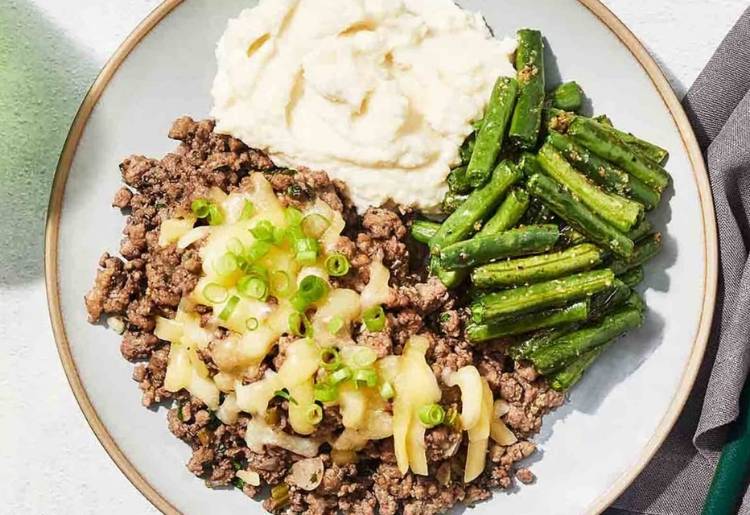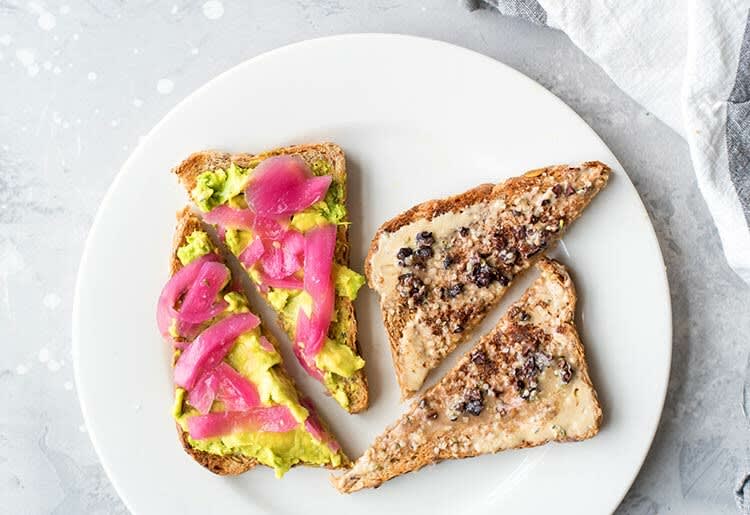The rules for following low carb, high fat, ketogenic diets are not always straightforward though, so mistakes are common whether you’re just starting out or you’ve been at it for a while.
If the “keto flu” stopped you short, or you just didn’t see the benefits everybody else raves about on keto, don't worry: you’re not alone. Keep these common mistakes in mind and implement these key strategies for success.
1. Eating too many carbs
Read any ingredients list and you're sure to see that hidden sugar and refined carbs are in most processed foods. That spells disaster on a ketogenic diet, so if you’re not reading every nutrition facts label, you’re probably getting more carbohydrates than you think you are.
Get to know all the names sugar goes by (maltodextrin, rice syrup, fruit concentrates are a few common ones) to make sure you're not accidentally eating too many carbs.
Even if you are closely counting your carbohydrates, there’s a good chance that you need a different amount of carbs than your neighbor.
Many ketogenic diet strategies start by cutting your carbohydrate count to 30 – 50 grams per day and then increasing them to a higher level that still keeps you in ketosis. Depending on your exercise level and your individual body, your personal carbohydrate level for ketosis could range from 30 grams to 100 grams, but generally stays around 50-60 grams per day.
Start cutting carbs today with $90 OFF throughout your first 3 boxes at Factor_.

2. Eating too much or too little protein
Protein is a tricky subject for low-carb diets because every person’s ideal amount is individualized. If you eat too much protein, your body might start using it to make glucose (called gluconeogenesis), effectively bumping you out of ketosis.
If you don’t eat enough, you run the risk of being constantly hungry and may lose muscle at the same time you’re losing fat — not a good thing!
The daily protein intake recommended by the U.S. Dietary Guidelines for Americans for an inactive adult is 0.8 grams of protein for every kilogram of body weight (that’s 0.36 g protein/pound of body weight or 65 grams per day for the average 180 pound American).
If you’re exercising regularly or trying to maintain muscle while losing fat, you may need to increase the amount of protein you are eating. If you’re getting the recommended minimum of 2.5 hours of moderate physical activity per week, the average person should shoot for 110–120 grams of protein per day.
3. Eating too many calories (from fat)
A ketogenic diet often leads to weight loss, but that doesn’t mean there’s anything magical about it. The vast majority of weight loss comes down to eating fewer calories than you burn and the ketogenic diet helps many people do just that. Not only are calories from fat and protein more filling than calories from carbohydrates, but being in ketosis may lead to feeling less hungry throughout the day.
That said, if your carbohydrates and proteins are perfectly portioned, but your weight goals have plateaued, you might be accidentally eating more calories — typically, fat calories — than you need to. Try cutting the amount of oil or fat you add during cooking and in dressings, or limiting your total portion size to get your calories lower and the weight off.
Enjoy Calorie Smart meal kits for as little as $9.99 per meal from HelloFresh!
4. Not meal planning
Even if you have all the self-discipline in the world, one of the hardest parts about a ketogenic diet is watching everybody else eat all the carbs they want. Set yourself up for success by planning out your meals on a weekly basis.
Remember to account for snacks on the go and have a list of go-to keto-friendly meals you can order at a restaurant. If meal planning is the crux of going keto for you, check out our list of best keto meal-delivery services so you don’t even have to think about counting carbs.
When worst comes to worst, have a bottle of medium-chain triglyceride (MCT) oil handy. If you have no choice but to eat carbs, smothering them in MCT oil is one way to do damage control — your ketone levels might dip, but with enough MCT oil, even popcorn can be keto-friendly.
Now you can order healthy and delicious meal kits from Home Chef with $90 off!
5. Not getting enough vitamins and minerals from fruit and vegetables
Vegetables have carbs, but that doesn’t mean you should avoid them. If anything, non-starchy vegetables like broccoli, spinach, kale, cauliflower, asparagus, and most green leafy vegetables should be emphasized, not eliminated, on any ketogenic diet.
Vegetables are known for providing fiber, vitamins, and unique plant chemicals that support health. Fiber is essential for gut health, happy gut bacteria, reducing inflammation, and regular, easy bowel movements.
Veggies are also great sources of the vitamins and minerals that you need to burn calories; some of these, like vitamin C, are hard to find outside the plant kingdom, and others, like magnesium, potassium, and calcium, represent common deficiencies in U.S. diets.
Being rich in anti-inflammatory polyphenols and fiber, berries can be a healthy sweet treat for keto dieters. Reach for wild blueberries for their high fiber, low sugar, and high antioxidant content.
If you’re eating veggies and still aren’t getting enough fiber (about 28 grams for women and 34 grams for men), then consider adding a fiber supplement to your diet — it might even help your ketone levels.
6. Not getting enough electrolytes and water
When you start a ketogenic diet you’ll probably notice rapid weight loss and frequent urination due to a process called glycogen depletion. Because of the way ketosis affects your kidneys, you also end up losing more sodium in your urine.
When going on a ketogenic diet, drink enough water and salt your food to taste to replenish what you lose and avoid the side effects of the “keto flu”.
The color of your urine is an easy way to tell how hydrated you are: the darker the yellow, the more dehydrated you are and salt your food to taste. Talk with your doctor to see if you need to eat more sodium on a ketogenic diet, and consider a potassium-fortified salt so you can get both electrolytes at once.
7. Eating too many processed foods (dirty keto)
There’s nothing wrong with an occasional packaged keto indulgence or a diet soda — it might be what keeps you sane on those long days when nothing else seems to satisfy. But, as with any diet plan, you should be getting your nutrition from whole foods when you can.
Processed, packaged keto foods often have calorie-free natural and artificial sweeteners that can upset your stomach and prime your brain to want more. Besides packaged foods, processed meats like bacon and deli meats are linked with an increased risk of cancer.
Research hasn’t shown whether this relationship holds true for keto dieters, but it’s probably best to not use your diet as an excuse to eat junk food. Substitute healthy keto snacks, and if you want to remove all the guesswork check out which keto meal delivery services offer snacks to your doorstep.
8. Not getting enough exercise
Besides being a way to burn calories and preserve your muscle mass when you’re losing fat, there’s another reason to hit the gym when you're in ketosis: the metabolic benefits.
Your muscles eat up extra glucose in your blood and burn calories even at rest, so exercise is an important component of a healthy ketogenic lifestyle.
Although different types of exercise will burn more fat or build more muscle, when it comes to getting rid of excess glucose and lowering high insulin levels, research suggests that aerobic “cardio” exercise and resistance exercise with weights work to about the same extent.
If you’ve eaten a few too many carbs, go for a brisk walk or fast bike ride to get your blood glucose down and your ketones back up.
9. Not managing your stress
Ever heard of “stress-eating”? For total health, you have to think beyond diet and exercise. Stress can be a major contributor to not reaching your goals and it cancels out many of the positive effects of an otherwise healthy lifestyle. High cortisol (a stress hormone) can deplete your magnesium levels, causes high blood pressure, and can even make you crave sweets and other comfort foods.
Fortunately, there are so many ways to lower your stress levels that one of them will work for you. Yet another benefit of exercise is its ability to lower cortisol and other stress hormones while improving mood.
Yoga, meditation, mindfulness-based stress reduction, and other mind-body practices have each been studied for their stress- and inflammation-lowering effects. Walking the dog, playing with kids, engaging with your community — prioritize whatever helps you unwind and your diet will be easier to stick to and more effective.
10. Not telling your doctor
People have their reasons for not telling their doctor the whole truth, but going on a ketogenic diet should not be one of them. Ketogenic diets might be touted as a miracle way to lose weight or improve metabolic health, but the truth is: they only work for about half the population.
In some people, ketogenic diets can raise LDL (“bad”) cholesterol. In people with diabetes, ketosis may require medication changes. Going keto might also be associated with an increased risk for kidney stones, especially in people with a family history.
If you have genetic variations that cause carnitine enzyme deficiencies, mitochondrial defects, or porphyria, going low carb could be dangerous.
Always discuss diet and lifestyle changes with a qualified healthcare practitioner. You may be able to modify your ketogenic diet with their help to make sure you’re not making mistakes that end up costing you in the long run.
Takeaways
If you’re ready to give the ketogenic diet a shot, check out our top ten list of keto-friendly meal kits. But be mindful of the most common mistakes beginners make and you’ll achieve ketone-powered success. Here’s a recap of the most important strategies:
- Get your macros right: the number of calories coming from protein, fat, and carbohydrate makes the biggest difference in whether you’re going to be successful or not with keto.
- Eat your (low-sugar) fruits and (non-starchy) veggies; these superfoods are where you’re going to get the vitamins and minerals your body needs to work at its best.
- Drink lots of water and enough sodium. Talk to your doctor or dietitian about how much sodium you should be eating.
- Limit keto junk food and set yourself up for success by planning out your meals. If you don’t want to track every single carb all the time, try out these keto meal delivery services to take the guesswork out of your diet.
- Exercise regularly and destress in whatever way works best for you.
- Talk with your doctor about whether a ketogenic diet might be right for you.
